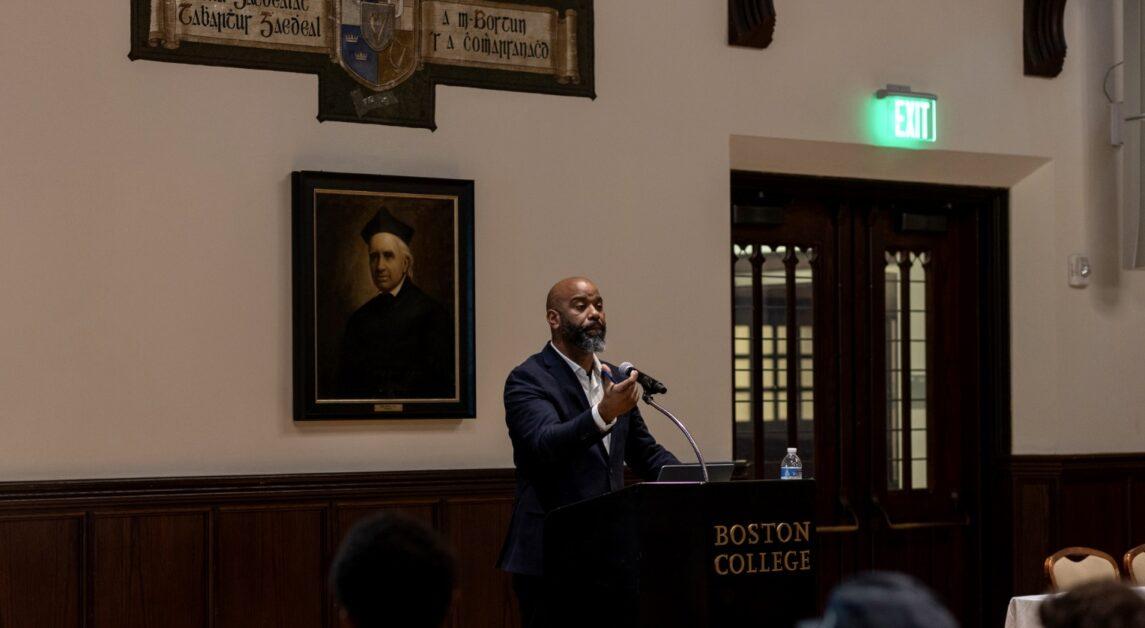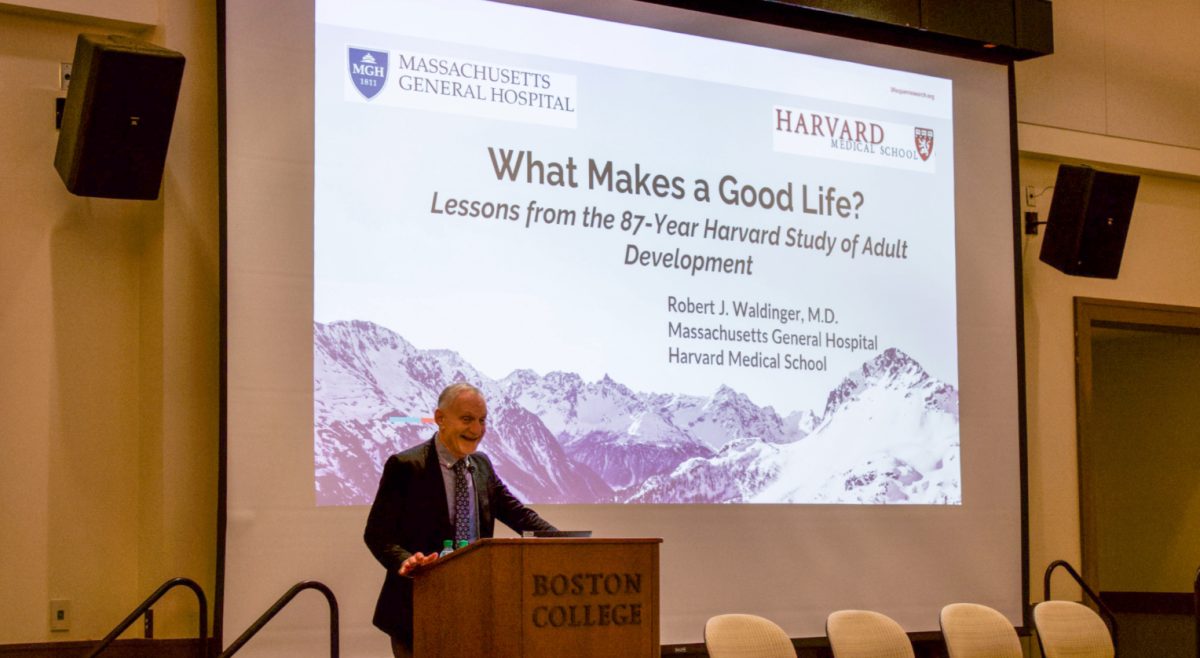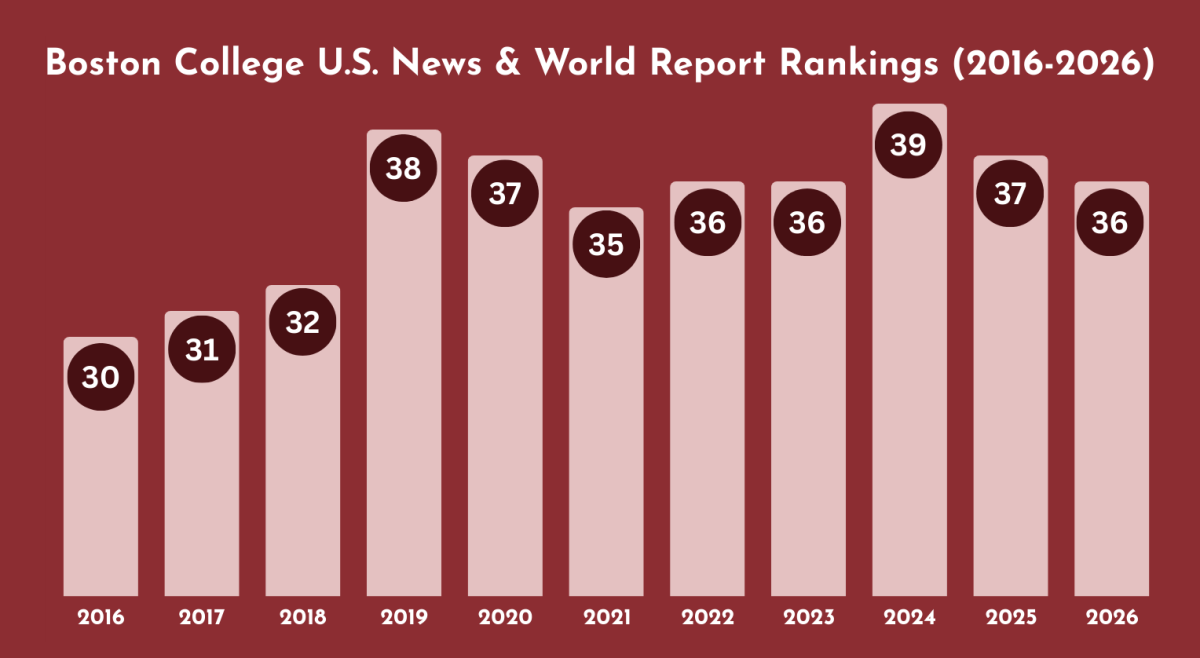Boston College is rejecting a recent call from the Vatican for Catholics to divest from companies and industries engaged in activities “harmful to human or social ecology” and the environment. The call appeared in a Vatican document released on the fifth anniversary of the publication of Pope Francis’ papal encyclical calling for action against climate change, Laudato Si’.
“As a private university, Boston College’s decisions regarding investments and governance are made by University leadership, in concert with the Board of Trustees,” Associate Vice President for University Communications Jack Dunn said in an email to The Heights. “While we welcome the Vatican document, our position regarding divestment remains unchanged.”
BC keeps its investments private, but the University has resisted calls to divest from the fossil fuel industry for years, saying that the University does not see its investments as a vehicle for social progress. BC has also said that it does not view divestment as a viable response to climate change and that members of the BC community should work to reduce energy consumption and promote sustainable activity.
Chief Investment Officer John Zona’s office declined to comment on the University’s decision not to divest after the release of the Vatican document.
The Vatican manual released Thursday, titled “Journeying toward Care for Our Common Home – Five Years After Laudato Si’,” calls on Catholics to “shun companies that are harmful to human or social ecology, such as abortion and armaments, and to the environment, such as fossil fuels,” according to Reuters.
Though the document comes out of the Vatican, the headquarters of the Roman Catholic Church, it is not official Catholic teaching, meaning that Catholics are not required to follow the Vatican’s calls to divest.
“In a major development yesterday the Vatican called on Catholics around the world to divest from fossil fuels,” Climate Justice at BC said in a statement. “The debate CJBC has been having with the administration of Boston College for over 7 years is now over. There can be no more obfuscating or denying BC’s moral obligation to take action. It is time to divest.”
Divestment has received substantial support from BC students in recent years. In the 2019 Undergraduate Government of BC election, a non-binding referendum calling on BC to divest from fossil fuels passed with more than 80 percent of the vote, with more than 2,000 students casting ballots in favor of divestment. BC rejected the referendum.
BC has a pattern of ignoring popular student referendums—in 2018, a non-binding referendum calling for BC to allow a student organization to distribute contraceptives on campus passed with 94 percent of the vote. BC rejected the referendum, citing the University’s Jesuit Catholic values.
BC also continues to reject student demands for an LGBTQ+ resource center, saying BC supports its LGBTQ+ students in other ways. In 2005, BC canceled a dance hosted by the new GLBTQ Leadership Council, saying it promoted a lifestyle conflicting with Catholic values.
Many other colleges and universities have recently announced that they are divesting from fossil fuels, including the University of California, Cornell University, Middlebury College, and the University of Massachusetts. Seattle University and Georgetown University, two Jesuit schools, had both previously announced plans to divest from fossil fuels, citing commitments to sustainability inspired by their Jesuit Catholic values.
“Animated by our Catholic and Jesuit identity, our University has sought to strengthen opportunities for our community to contribute to a more sustainable future by fostering dialogue, research, education and the engagement of all members of our community,” Georgetown President John J. DeGioia said in a Georgetown release earlier this year.
In late February, BC agreed to conversations with CJBC surrounding environmental sustainability. Shortly after a meeting between CJBC, Associate Vice President for Student Engagement Tom Mogan, and Vice President for Student Affairs Joy Moore to set the agenda for the conversations, BC moved classes online for the semester due to the COVID-19 pandemic.
Mogan emailed CJBC in March postponing the conversations until students returned to campus in the fall and saying that preparation for the fall semester was the administration’s top priority.
Several days after CJBC participated in virtual Earth Day protests calling for “climate justice,” Mogan sent an email to CJBC member Kyle Rosenthal, CSOM ’21, in which he said he and Moore had been forwarded an email that Rosenthal sent to a senior administrator regarding divestment.
“Communications by you and members of your group that include demands and threats are counterproductive and work against your stated goal of having a productive dialogue,” Mogan wrote in the email.
“As I stated in my earlier communication, when we return to campus in the fall we will plan to set up a meeting, provided that you cease sending emails to senior administrators with language that includes demands and threats. If you would like to discuss this, I am happy to set up a Zoom call.”
When asked by The Heights over email, Mogan did not elaborate on any specific email he was referring to, but he offered language from a previous public CJBC statement as an example of threats.
Mogan quoted one email an administrator received as saying: “If a public response or intention to meet with us is not made, we will begin a disruption of daily activities at BC taking the form of near-constant hunger strikes, die-ins, and protests.” This statement appeared in a list of demands that CJBC delivered to administrators after a fossil fuel divestment protest in February.
“As my April email to Climate Justice indicated, I offered to schedule a Zoom call to discuss the issues addressed in my email and that offer remains open,” Mogan wrote in an emailed statement to The Heights.
Rosenthal takes a different interpretation of both his and CJBC’s communications with BC, saying “we would never threaten the University.” He said that Mogan did not respond when he asked which email Mogan was referring to as containing “demands and threats,” but he provided The Heights with emails he sent to administrators outside of his role in CJBC around the time of Mogan’s email.
“At this point, I don’t care what your reason is: Earth Day, the moves of other schools, a sense of environmental or moral obligation, or financial impacts, but something needs to happen and now,” Rosenthal wrote in an email to Zona on April 22.
“As I have repeatedly said, I love Boston College and all the experiences and people here and it is that love and the things I learned here that have given me the courage to write something like this,” Rosenthal wrote later in the email. “I hope you have a blessed Earth Day and that we can start being serious about some action or plan.”
In a statement to The Heights, CJBC expressed hope that the meetings between CJBC and administrators will be able to move forward this fall but stood firm in its demands to discuss divestment as part of these meetings.
“While CJBC does hope the administration keeps its agreement to meet with us in good faith in the fall, we reiterate that divestment must be considered today despite the administration stating its intention to completely ignore the issue and prevent real dialogue on it,” the statement reads.



















